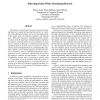5 search results - page 1 / 1 » Maximizing the Fault Tolerance Capability of Fixed Priority ... |
RTCSA
2008
IEEE
13 years 11 months ago
2008
IEEE
Real-time systems typically have to satisfy complex requirements, mapped to the task attributes, eventually guaranteed by the underlying scheduler. These systems consist of a mix ...
ECRTS
2000
IEEE
13 years 9 months ago
2000
IEEE
The imprecise computation(IC) model is a general scheduling framework, capable of expressing the precision vs. timeliness trade-off involved in many current real-time applications...
TPDS
2008
13 years 4 months ago
2008
An ad hoc grid is a wireless heterogeneous computing environment without a fixed infrastructure. This study considers wireless devices that have different capabilities, have limite...
HPDC
2010
IEEE
13 years 4 months ago
2010
IEEE
Parallel computing on volatile distributed resources requires schedulers that consider job and resource characteristics. We study unconventional computing environments containing ...
CORR
2007
Springer
13 years 4 months ago
2007
Springer
– Redundant sensing capabilities are often required in sensor network applications due to various reasons, e.g. robustness, fault tolerance, or increased accuracy. At the same ti...

